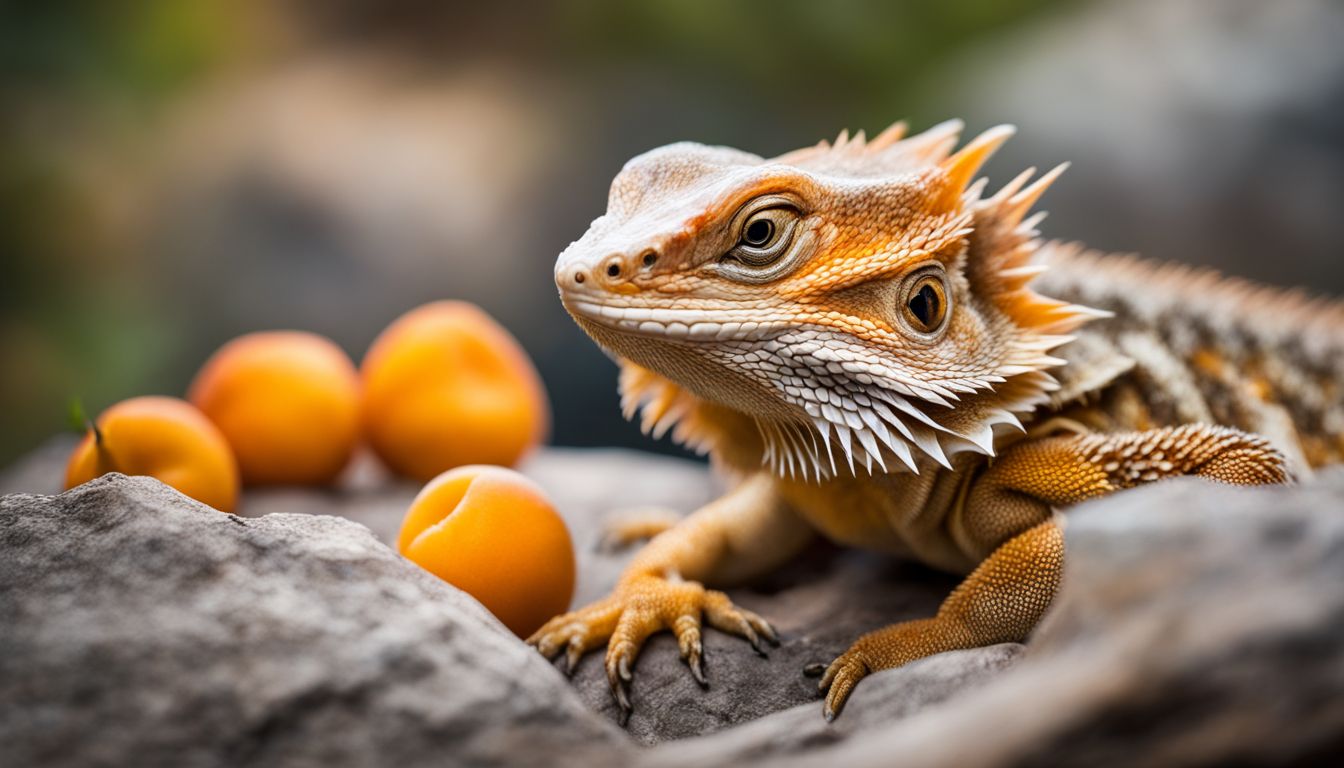Deciding what to feed your bearded dragon can often leave you scratching your head, wondering if certain fruits like apricots are safe. Apricots are known for their sweet taste and nutritional benefits.
This article will guide you through the ins and outs of including apricots in your bearded dragon’s diet, covering both the good and the bad. Stick around to learn how to treat your scaly friend right!
Nutritional Content of Apricots

Apricots are rich in essential vitamins like A and C, promoting the overall health of bearded dragons. They also provide dietary fiber, contributing to digestive wellness and preventing constipation for your pet.
Vitamins
Apricots pack a punch with vitamin A and C, both crucial for your bearded dragon’s health. Vitamin A supports good vision, skin health, and immune function. Meanwhile, vitamin C boosts their immune system, helping them fight off sickness more effectively.
These nutrients make apricots an excellent choice for adding variety to your pet’s diet while ensuring they get these essential vitamins.
Feeding your reptile friend fresh fruits like apricots can enhance its diet with natural sources of vital nutrients. The combination of vitamins found in this fruit contributes positively to overall wellness and digestion in bearded dragons.
Plus, the hydration from the fruit’s natural water content is a bonus for their health.
Dietary Fiber
Apricots shine as a source of dietary fiber, boasting 1.5 grams per 100 grams. This fiber plays a crucial role in bowel regularity for bearded dragons, helping prevent constipation and ensuring their digestive system runs smoothly.
High-fiber diets like those including apricots can bolster the health of these pets by aiding digestion and maintaining bowel health.
Incorporating apricots into your bearded dragon’s diet offers more than just tasty variety; it supports their digestion and contributes to overall well-being. Next up, let’s explore the antioxidant properties of apricots and how they benefit your scaly friend.
Antioxidant Properties
Apricots burst with antioxidants, those powerful agents that fight off free radicals. This fruit contains a rich mix of bioactive phytochemicals including carotenoids, flavonoids, and phenolics.
These antioxidants are key to battling the damage caused by free radicals. They not only protect cells but also offer numerous health benefits.
Introducing apricot-based foods into a diet boosts antioxidant intake significantly. For bearded dragons, this means better overall health and vitality. The presence of these nutrients makes apricots an excellent addition to their meals.
Bearded dragon owners can feel confident knowing they’re providing a food that supports their pet’s well-being through its antioxidant-rich properties.
Potassium
Apricots contain potassium, an essential mineral for bearded dragons. This nutrient supports proper muscle and nerve function, promoting overall health and wellbeing. Bearded dragons can benefit from the potassium found in apricots as part of a balanced diet.
Including this nutritious option in moderate intake can contribute to their dietary needs.
Potassium is crucial for maintaining the optimal functioning of muscles and nerves in bearded dragons. It plays a vital role in supporting their overall health, making apricots a suitable fruit for them to consume as part of their moderate intake fruit consumption.
Natural Sugar
Transitioning from potassium, it’s essential to understand the natural sugar content in apricots. Apricots contain natural sugars that can contribute to the fruit’s sweet taste. However, be cautious as these sugars should be monitored when feeding your bearded dragon, as excessive sugar consumption can lead to health issues like obesity and diabetes.
Keep an eye on the amount of high-sugar fruits you feed your pet reptile to ensure their well-being.
Apricots harbor approximately 3.89 grams of naturally occurring sugar per 100 grams of fruit. While this natural sweetness can make them appealing for pets, overconsumption poses potential risks such as weight gain and other related health complications – something crucial for a healthy bearded dragon diet.
Low Calories
Apricots are a great choice for bearded dragons because they are low in calories. With only 34 calories per fruit, apricots make a healthy addition to their diet. Unlike dried fruits, fresh apricots have lower sugar levels and are high in water content, making them an excellent weight-loss friendly fruit option for your bearded dragon.
In addition to being low in calories, apricots also provide essential vitamins A and C, supporting your pet’s overall health.
Fresh apricots contain natural sugars but remain low in calorie content. This makes them an ideal nutritional snack option for your bearded dragon without compromising on their dietary needs or adding unnecessary bulk to the diet plan.
Benefits and Risks of Feeding Apricots to Bearded Dragons

Apricots offer essential vitamins and fiber, promoting overall health in bearded dragons. However, their high natural sugar content may lead to weight gain and potential health issues if fed excessively.
Health Benefits
Apricots offer essential health benefits for bearded dragons. Their high vitamin A content supports good eyesight and enhances the immune system. With low calories and valuable nutrients including carbs, protein, and fiber, apricots are a wholesome choice for your pet.
They also provide key vitamins, minerals, and antioxidants that can boost the overall health of bearded dragons while satisfying their taste buds.
Potential Risks
Switching to the potential risks of feeding apricots to bearded dragons, it’s crucial to note that their high sugar and carbohydrate content can lead to obesity and metabolic issues.
Additionally, the imbalanced calcium-to-phosphorus ratio in apricots can harm the overall health of bearded dragons. Moreover, due to their high acid content, apricots also pose a risk of causing stomach issues for these reptiles.
Considering these factors is essential when planning a balanced diet for your bearded dragon.
The high sugar content in apricots can cause digestive problems and stomach issues for bearded dragons, while their imbalanced calcium-to-phosphorus ratio may lead to depletion of vital nutrients necessary for maintaining optimal health in these reptiles.
Guidelines for Feeding Apricots to Bearded Dragons
Feeding apricots to bearded dragons should be done in moderation. Monitor their reaction after the first serving for any signs of digestive issues or discomfort.
Frequency
Young bearded dragons should eat insects once or twice a day, while adult dragons may only need to consume insects every 24-72 hours. As they grow, juvenile bearded dragons should transition to eating more greens and fewer insects over time.
This encourages them to develop a healthier diet as they mature.
When feeding your bearded dragon, take into account its stage of life and adjust the frequency of insect consumption accordingly.
Portion Size
Bearded dragons should eat apricots in moderation, making up no more than 10% of their diet. For portion size, aim for small pieces around the size of the dragon’s head to prevent choking hazards and ensure easy digestion.
Fresh apricots are preferred over dried ones as they provide more hydration and nutrition. Remember that feeding charts are crucial for offering bearded dragons the best diet based on their age group.
Ensure that you offer a variety of fruits and vegetables to maintain a balanced nutritional intake. Keep an eye on your pet’s health and adjust the portion size accordingly if needed – it’s vital to monitor their behavior and physical condition when introducing new foods into their diet routine.
Preparation
When offering apricots to your bearded dragon, ensure they are ripe and thoroughly washed to remove any pesticides or contaminants.
Before feeding the apricot to your pet, remove the pit as it can pose a choking hazard and should not be consumed by the reptile.
Alternatives to Apricots for Bearded Dragons
Bearded dragons can also enjoy treats like banana peppers. Check out our blog for more exciting food options!
Including Banana Peppers
When it comes to feeding your bearded dragon, banana peppers can be a suitable alternative to apricots. These peppers are high in water content and low in nutritional value, making them an ideal occasional addition to your pet’s diet.
Moderation is key when offering banana peppers to your bearded dragon, ensuring they maintain a balanced and varied diet while enjoying the benefits of this low-sugar treat.
Remember that a well-rounded diet for bearded dragons includes a variety of foods, so incorporating alternatives like banana peppers can provide additional nutrients and hydration without compromising their overall health.
Conclusion
In summary, apricots can be a tasty and occasional treat for bearded dragons.. They offer some nutritional benefits such as vitamin C and fiber but should be given in moderation due to their high sugar content..
Always consider the calcium-to-phosphorus ratio when feeding apricots to your pet.. It’s important to provide a balanced diet and variety of treats to keep your bearded dragon healthy and happy.
Remember to consult with a veterinarian if you have any concerns about adding apricots or other fruits to their diet.
FAQs
1. Can bearded dragons eat apricots?
Yes, bearded dragons can eat apricots as an occasional treat.
2. Are apricot seeds safe for bearded dragons to consume?
No, apricot seeds should not be given to bearded dragons as they contain cyanide and can be harmful.
3. How should I prepare apricots for my bearded dragon?
Wash the apricot thoroughly, remove the pit, and then cut it into small pieces before feeding it to your pet.
4. How often can I feed apricots to my bearded dragon?
Apricots should only be offered occasionally as part of a varied diet – once or twice a month is sufficient.
5. What are the potential risks of feeding too many apricots to a bearded dragon?
Feeding too many apricots may lead to digestive issues due to their high sugar content and could cause obesity over time if given excessively.




